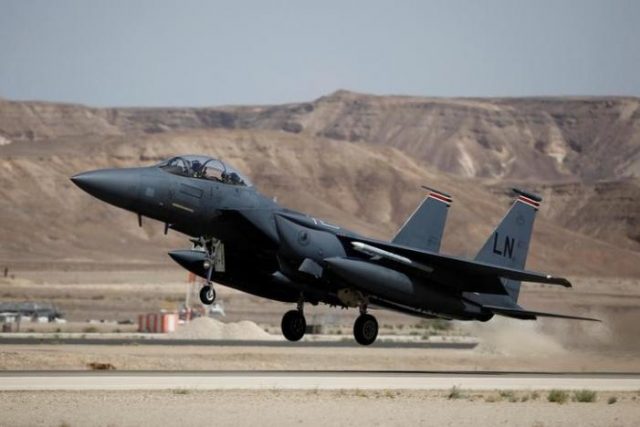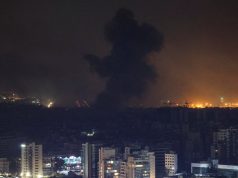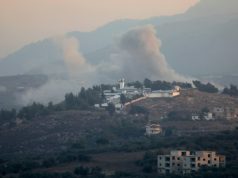
DOHA — A $12-billion deal to buy U.S. F-15 fighter jets shows Qatar has deep-rooted support from Washington, a Qatari official said on Thursday, despite President Donald Trump’s repeated accusations that Doha supports terrorism.
Qatar is facing a severe economic and diplomatic boycott by Saudi Arabia and its regional allies who cut ties last week, in the worst rift among Gulf Arab states in years. They accuse Qatar of funding terrorism, fomenting regional unrest and cozying up to their enemy Iran, all of which Qatar denies.
The fighter jet deal came amid increased diplomacy to try to resolve the crisis.
Trump has repeatedly echoed the accusations against Qatar, even as his Defense and State Departments have tried to remain neutral in the dispute among key allies. Qatar hosts a big U.S. military base housing the headquarters of U.S. air forces in the Middle East.
On Wednesday U.S. Defense Secretary Jim Mattis signed the previously approved Boeing plane deal with Qatari Minister of State for Defense Affairs Khalid al-Attiyah. Qatar’s ambassador to the United States, Meshal Hamad al-Thani, posted a picture of the signing ceremony on Twitter.
“This is of course proof that U.S. institutions are with us but we have never doubted that,” a Qatari official in Doha said. “Our militaries are like brothers. America’s support for Qatar is deep-rooted and not easily influenced by political changes.”
In Washington, a State Department spokeswoman said the United States continued to work with Qatar and other governments in the region and the planes deal had been years in the making.
“We see it as a tangible show of support for our defense relationship and their commitment to the United States,” spokeswoman Heather Nauert told reporters.
A Qatari defense ministry source said the deal was for 36 jets. In November, under the administration of former President Barack Obama, the United States approved a possible sale of up to 72 F-15QA aircraft to Qatar for $21.1 billion. Boeing, the prime contractor on the sale, declined to comment.
Turkish Foreign Minister Mevlut Cavusoglu, on a Gulf tour trying to help broker an end to the crisis, defended the deal.
“Just like other countries, like Saudi Arabia, the United Arab Emirates, Egypt … it is natural for Qatar to buy airplanes or parts necessary for its own defense,” Cavusoglu said in Kuwait following talks with his Kuwaiti counterpart, according to Turkey’s state-run Anadolu news agency.
Turkey is friendly to Qatar and has sent food supplies since the sanctions were imposed. Kuwait has led efforts to mediate the dispute which had affected food imports and raised questions over the Gulf Arab state’s plans to host the 2022 World Cup.
A European diplomat in the Gulf said the timing of the deal appeared coincidental.
“Presumably the U.S. could have delayed the deal if they’d wanted to, although I don’t think there’s a great connect between sales and foreign policy.”
Important air base
Qatar is an important base for the U.S. military carrying out operations against Islamic State militants and other groups in Iraq, Syria, Afghanistan and beyond. Al Udeid Air Base is home to more than 11,000 U.S. and coalition troops.
Two U.S. warships arrived at Hamad port in Qatar as part of a planned joint military exercise involving marine forces, Qatar’s state news agency said on Wednesday.
Cavusoglu, who visited Qatar and Kuwait to try to push diplomatic efforts to resolve the crisis, said on Thursday he intends to travel to Saudi Arabia on Friday for talks with Saudi King Salman bin Abdulaziz about the crisis.
“Saudi Arabia is important and the Saudi King is respected by everyone. Our expectation from King Salman is that he be the leader in solving this problem,” Cavusoglu said at a joint news conference with his Tunisian counterpart.
U.S. Secretary of State Rex Tillerson spoke by telephone with his Omani counterpart, Oman state news agency reported. The foreign ministry said foreign affairs minister Youssef bin Alawi called for support of Kuwaiti mediation efforts as the best chance for resolving the crisis.
Turkey and Qatar have both provided support for the Muslim Brotherhood in Egypt – a broad movement whose Islamist goals are anathema to Egypt’s ex-military president, Abdul Fattah al-Sisi and to many of the Gulf’s dynastic rulers.
Conservative Gulf neighbors have long viewed Qatar’s foreign policy with suspicion, especially its refusal to shun Shi’ite Iran, and resented its state-funded broadcaster Al Jazeera for airing critical views from across the region.
Qatar on Thursday said that preparations for the 2022 World Cup were unhindered, having secured alternative supplies of construction materials to those that had been coming by land from Saudi Arabia.
Qatar’s main port was also bustling with ships bringing food supplies and construction materials, witnesses said.
The Pentagon said the jets sale would increase security cooperation between the United States and Qatar and help them operate together. It added that Mattis and Attiyah had also discussed the current state of operations against Islamic State and the importance of de-escalating tensions in the Gulf.
The fighter jet deal had been stalled amid concerns raised by Israel that equipment sent to Gulf states could fall into the wrong hands and be used against it, and by the Obama administration’s broader decision-making on military aid to the Gulf.
Trump, who took office in January, has accused Qatar of being a “high-level” sponsor of terrorism, potentially hindering the State Department’s efforts to help ease the diplomatic crisis.









